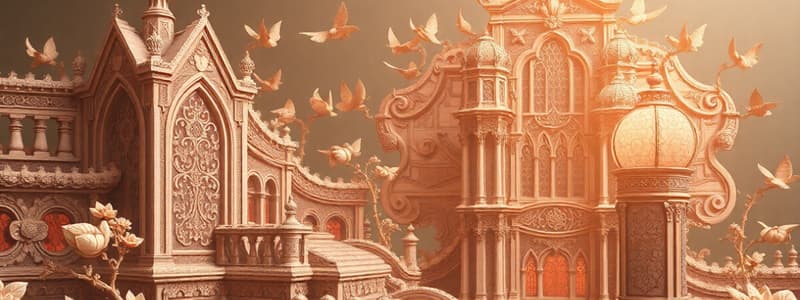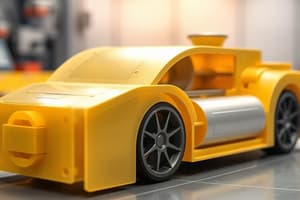Podcast
Questions and Answers
What is subtractive manufacturing?
What is subtractive manufacturing?
- Material is added layer by layer
- Material is removed from a solid block (correct)
- Parts are combined to create a finished product
- Material is shaped without removing material
Which technology automates manufacturing processes through computer controls?
Which technology automates manufacturing processes through computer controls?
- Computer-Aided Design (CAD)
- Artificial Intelligence (AI)
- Internet of Things (IoT)
- Computer-Aided Manufacturing (CAM) (correct)
What is a major goal of manufacturing technology?
What is a major goal of manufacturing technology?
- Increase the cost of production
- Reduce the use of technology
- Limit customization options
- Improve efficiency and quality (correct)
Which manufacturing process adds material layer by layer?
Which manufacturing process adds material layer by layer?
What does Industry 4.0 primarily involve?
What does Industry 4.0 primarily involve?
What is one of the challenges associated with adopting advanced manufacturing technology?
What is one of the challenges associated with adopting advanced manufacturing technology?
What benefit does digital twin technology provide?
What benefit does digital twin technology provide?
What is a focus of sustainable manufacturing?
What is a focus of sustainable manufacturing?
Flashcards are hidden until you start studying
Study Notes
Overview of Manufacturing Technology
- Definition: Application of engineering and technology to the design, production, and use of machines, tools, and systems for manufacturing products.
- Goals: Improve efficiency, quality, and profitability in the production process.
Types of Manufacturing Processes
- Subtractive Manufacturing: Material is removed from a solid block (e.g., machining, drilling).
- Additive Manufacturing: Material is added layer by layer (e.g., 3D printing).
- Formative Manufacturing: Material is shaped without removing material (e.g., molding, forging).
- Assembly Processes: Combining parts to create a finished product (e.g., welding, fastening).
Key Technologies in Manufacturing
- Computer-Aided Design (CAD): Software for creating precise drawings and technical illustrations.
- Computer-Aided Manufacturing (CAM): Software that automates manufacturing processes through computer controls.
- Robotics: Use of robots for tasks like welding, assembly, and material handling.
- IoT in Manufacturing: Internet of Things enhances connectivity and data exchange among devices and sensors.
- Artificial Intelligence (AI): Automates decision-making and optimizes production processes.
Trends in Manufacturing Technology
- Industry 4.0: Integration of smart technology, IoT, AI, and big data analytics to create smart factories.
- Sustainability: Focus on reducing waste, energy consumption, and environmental impact.
- Customization: Increased demand for personalized products, leading to flexible manufacturing systems.
- Digital Twin Technology: Virtual representation of a physical object or system for simulation and analysis.
Benefits of Advanced Manufacturing Technology
- Increased Productivity: Automation and efficient processes reduce time and labor costs.
- Improved Quality: Precision technologies lead to fewer defects and higher quality products.
- Enhanced Flexibility: Ability to adapt quickly to changes in demand and customization.
- Cost Savings: Streamlined processes and reduced material waste lower overall production costs.
Challenges in Manufacturing Technology
- Initial Investment: High costs associated with adopting advanced technologies.
- Skill Gap: Need for skilled workforce to manage and operate new technologies.
- Cybersecurity Risks: Increased connectivity raises vulnerability to cyber attacks.
- Supply Chain Disruptions: Global events can impact the supply of materials and components.
Future Directions
- Smart Manufacturing: Emphasis on intelligent systems that enhance decision-making.
- Sustainable Practices: Greater focus on eco-friendly technologies and reducing carbon footprint.
- Collaborative Robots (Cobots): Robots designed to work alongside humans safely and effectively.
Overview of Manufacturing Technology
- Definition encompasses engineering, technology, and design for machines and systems in product manufacturing.
- Goals aim to enhance efficiency, product quality, and overall profitability in production.
Types of Manufacturing Processes
- Subtractive Manufacturing: Involves removing material from a solid mass; techniques include machining and drilling.
- Additive Manufacturing: Builds products layer by layer using added material; commonly associated with 3D printing.
- Formative Manufacturing: Shapes materials without removal; techniques involve molding and forging.
- Assembly Processes: Combines various parts into a complete product; includes methods like welding and fastening.
Key Technologies in Manufacturing
- Computer-Aided Design (CAD): Enables the creation of detailed technical drawings and models.
- Computer-Aided Manufacturing (CAM): Automates manufacturing tasks through software-controlled machinery.
- Robotics: Employs machines to perform tasks such as welding and assembly, enhancing speed and precision.
- IoT in Manufacturing: Connects devices and sensors for real-time data sharing and operational insight.
- Artificial Intelligence (AI): Utilized for automating decisions and optimizing production workflows.
Trends in Manufacturing Technology
- Industry 4.0: Represents a new era of manufacturing featuring advanced integration of smart technologies.
- Sustainability: Prioritizes reducing environmental impact and waste during production processes.
- Customization: Reflects growing consumer demand for personalized products, influencing manufacturing flexibility.
- Digital Twin Technology: Involves creating virtual models of physical entities to test and analyze performance.
Benefits of Advanced Manufacturing Technology
- Increased Productivity: Automation leads to reduced labor time and costs.
- Improved Quality: Precision manufacturing reduces defects, ensuring higher product standards.
- Enhanced Flexibility: Manufacturing systems can quickly adjust to shifts in market demand and customer preferences.
- Cost Savings: Efficient processes and minimized waste lower production expenditures.
Challenges in Manufacturing Technology
- Initial Investment: Significant costs are often required to implement advanced manufacturing technologies.
- Skill Gap: There is a demand for a skilled workforce to effectively operate new technology.
- Cybersecurity Risks: Higher connectivity increases potential threats from cyber attacks on manufacturing systems.
- Supply Chain Disruptions: Global events, such as pandemics or geopolitical issues, can disrupt material and component availability.
Future Directions
- Smart Manufacturing: Focuses on using intelligent systems for improved decision-making in operations.
- Sustainable Practices: Emphasizes eco-friendly technologies and lowering the carbon footprint in manufacturing.
- Collaborative Robots (Cobots): Designed to work safely alongside human workers, enhancing productivity and safety in the workplace.
Studying That Suits You
Use AI to generate personalized quizzes and flashcards to suit your learning preferences.




